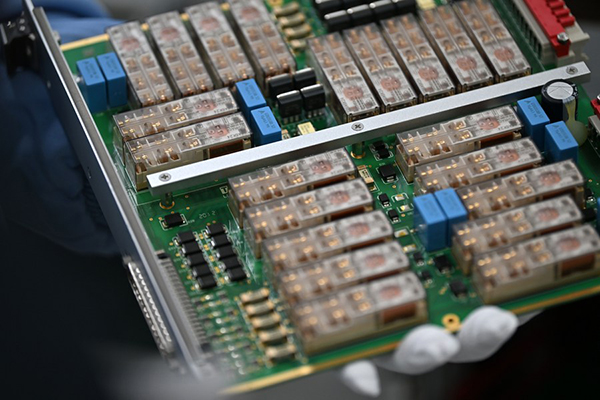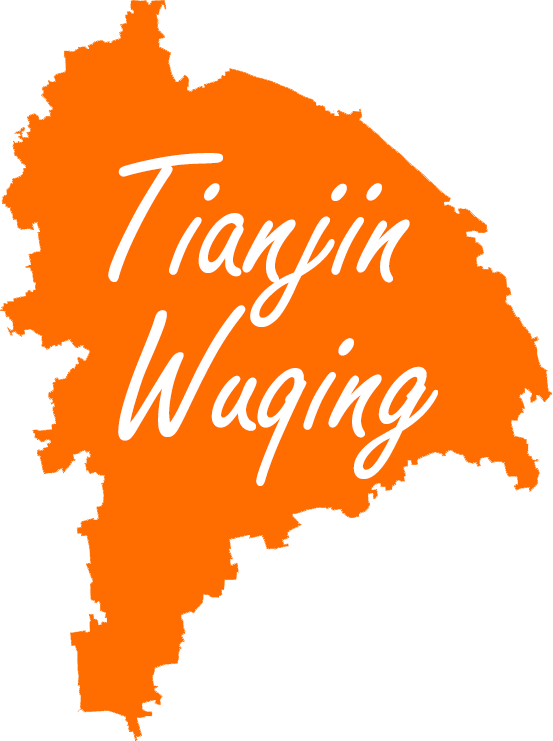
This photo taken on April 3, 2023 shows circuit boards produced by Traffic Control Technology Equipment Co Ltd in Wuqing district, North China's Tianjin. [Photo/Xinhua]
BEIJING -- The confidence of China's private entrepreneurs in pursuing high-quality development is picking up, buoyed by new orders, enhanced competitiveness and an improving business environment.
The revival of private companies and the improvement of private entrepreneur sentiment are crucial for the country's continued growth, as the private sector has been a key pillar sustaining China's economic expansion.
Economic experts and the media frequently use a combination of the numbers 50, 60, 70 and 80 to describe the private sector's contributions to the Chinese economy. The sector contributes approximately 50 percent of China's tax revenue, 60 percent of its GDP, 70 percent of its technological innovation, and accounts for 80 percent of its urban employment.
Development optimism in the private sector mirrors China's strong growth momentum in the first quarter of this year.
More orders, recovering expectations
Visiting customers, negotiating orders and participating in exhibitions have been daily tasks since the start of 2023 for Wang Xincheng, chairman of Changjiang Electric, a Hubei-based company specializing in intelligent energy construction and services.
The company's orders totaled 810 million yuan ($117 million) in January, and logged a year-on-year increase of 15 percent in the first quarter.
"The growth momentum is good, with new orders continuing to come in," Wang said, noting that the company is running at full capacity.
Changjiang Electric's experience echoes the broader recovery of the world's second-largest economy. The Chinese economy registered better-than-expected 4.5 percent growth in the first quarter of this year, with factory output and household consumption both bouncing back.
China's private sector, in particular, posted a highly anticipated recovery. Despite weak global growth, the foreign trade of China's private firms jumped 14.4 percent from a year earlier in the first quarter, accounting for 52.4 percent of the country's total.
The Small and Medium Enterprises Development Index, based on a survey of 3,000 small and medium enterprises in China, rebounded to 89.3 in the first quarter of 2023, up from 88 in the previous quarter. Its sub-indexes for all eight major sectors, including construction, transport, and accommodation and catering, rose across the board.
"The overall economy is recovering. More importantly, central and local governments have sent a clear signal of support for the development of the private sector," said Wu Xiaoquan, COO of Nanjing TICA Climate Solutions Co Ltd, "We are confident in our future."
TICA's business performance rose 10 percent to 15 percent in the first three months of this year, with orders for industrial manufacturing projects and overseas markets increasing significantly.
Sharpening new edges
Despite China's sound growth momentum, many private entrepreneurs have said that more time is needed for a full market recovery from the COVID-induced economic fallout, citing challenges such as rising costs, difficulties in financing and recruitment, as well as weak global demand.
Tang Fangming, assistant general manager of Jiangsu Hengli Chemical Fiber Co Ltd, said that despite an uptick in order numbers, companies in the sector are "just getting back on their feet," and the foundation for recovery has not yet solidified.
In an effort to seize the initiative for development, the company has doubled down on its efforts in research and development, seeking to explore its development space by tapping into new materials and new energy.
Shenghong Group, a textile industry leader in East China's Jiangsu province, has accelerated its presence in the emerging new energy, new materials, and green and low-carbon development sectors.
The company's capacity to produce regenerated fibers made from waste plastic bottles now accounts for more than 50 percent of the global market share.
Wuhan Jingce Electronic Group Co Ltd, a high-tech enterprise that provides products and services for testing in fields such as semiconductors, displays and new energy, has more than doubled its R&D spending from 288 million yuan in 2019 to 589 million yuan in 2022.
This emphasis on R&D led to the rollout of several pieces of high-end testing equipment, which later translated into three years of revenue growth for the company.
"Our business has been under pressure in recent years, but this also gives us an opportunity to improve our own capabilities and competitiveness," said Shen Yafei, the company's vice general manager.
Conducive business environment
While private enterprises make efforts to thrive, their business environment is also improving, with a slew of conducive measures and pledges made by governments at different levels.
Proper guidance should be given to the private sector for its healthy and high-quality development, and private firms should take the initiative to pursue high-quality development. These are messages delivered at the annual "two sessions" held in March this year.
On April 21, the first meeting of the commission for deepening overall reform of the 20th Communist Party of China Central Committee noted that supporting the private economy is a consistent principle of the CPC Central Committee.
It is also vital to help private enterprises find their right position in high-quality development and improve their development quality via self-reform and development, business compliance, as well as transformation and upgrading, said the meeting, which urged efforts to ensure precise implementation of preferential policies to effectively address the enterprises' difficulties.
In terms of policy implementation, in the past five years, private enterprises have enjoyed a total of more than 8 trillion yuan in new tax and fee cuts and tax deferrals as well as exemptions, accounting for about 70 percent of the total number, said Wang Jun, head of the State Taxation Administration, last month.
Of self-employed households in the private economy, 80 percent no longer pay taxes after the government implemented a series of support policies, according to Wang.
Since the beginning of this year, many localities across the country have introduced special policies and measures to support the private sector. These policies and measures involve fields such as financing, talent, technology and land use, and are expected to boost the confidence of private enterprises in development.
"Only when all parties work together to help ease the pressures and burdens of private firms can entrepreneurs feel relaxed, travel light and aim high," said Zhang Qing, deputy head of the Wuhan Small and Medium-sized Enterprises Association.
Hu Yufang, chairman of Suzhou Taihu Snow Silk Co Ltd, knew that embracing new opportunities would bring brighter prospects. "In the face of various uncertainties, we did not sit back and wait, but chose to face them head-on," Hu said.
The company, listed on the Beijing Stock Exchange, has used online livestreaming to expand its sales and managed to attract more offline customers by opening new outlets at sites popular online.
Liu Cong, chairman of the provincial federation of industry and commerce of Jiangsu, said that the overall market situation has been improving since the beginning of the year, and private entrepreneurs are becoming more confident, more energetic and more ambitious.
"As the supporting policies continue to sink in, we have the confidence to consolidate the momentum," Liu said.






